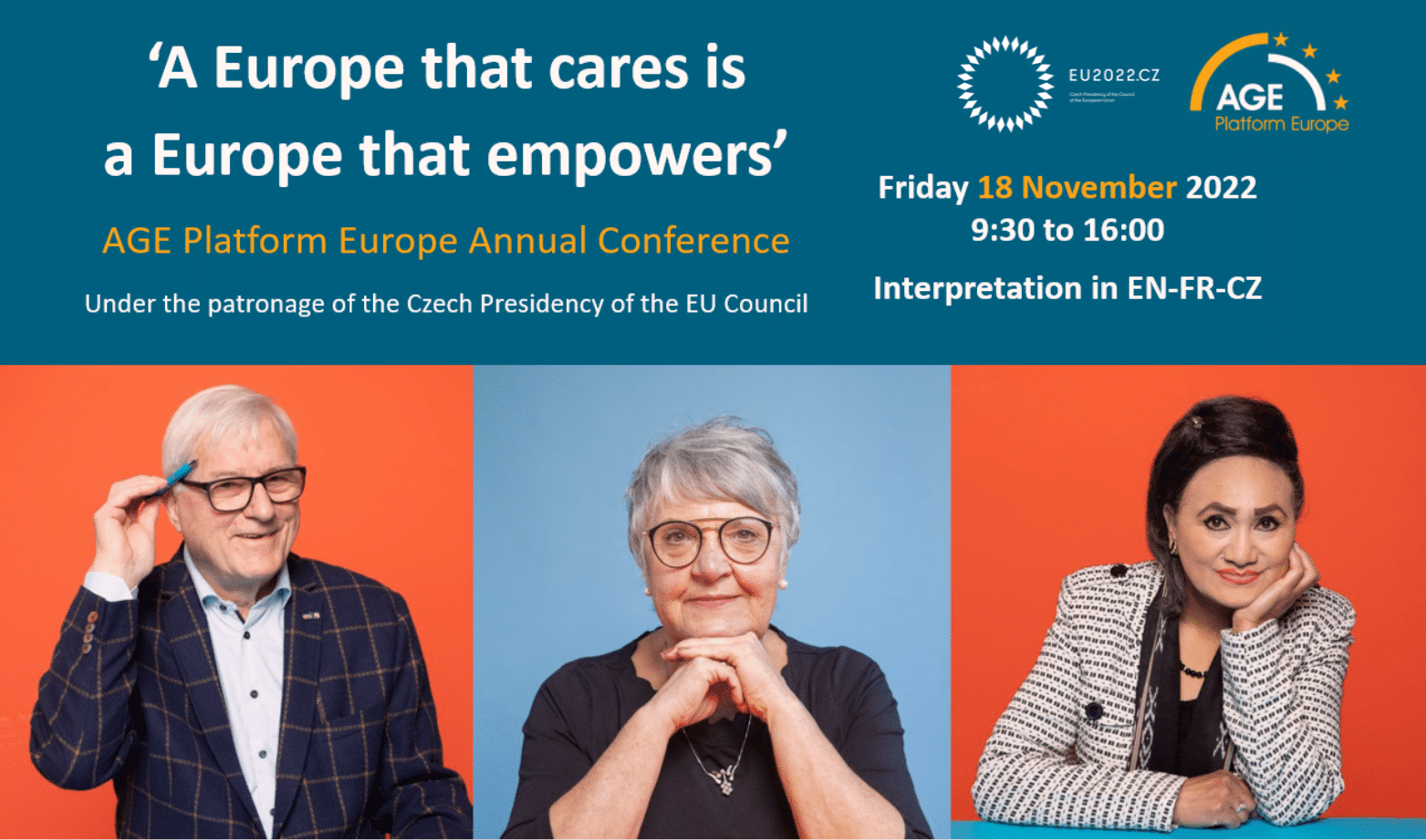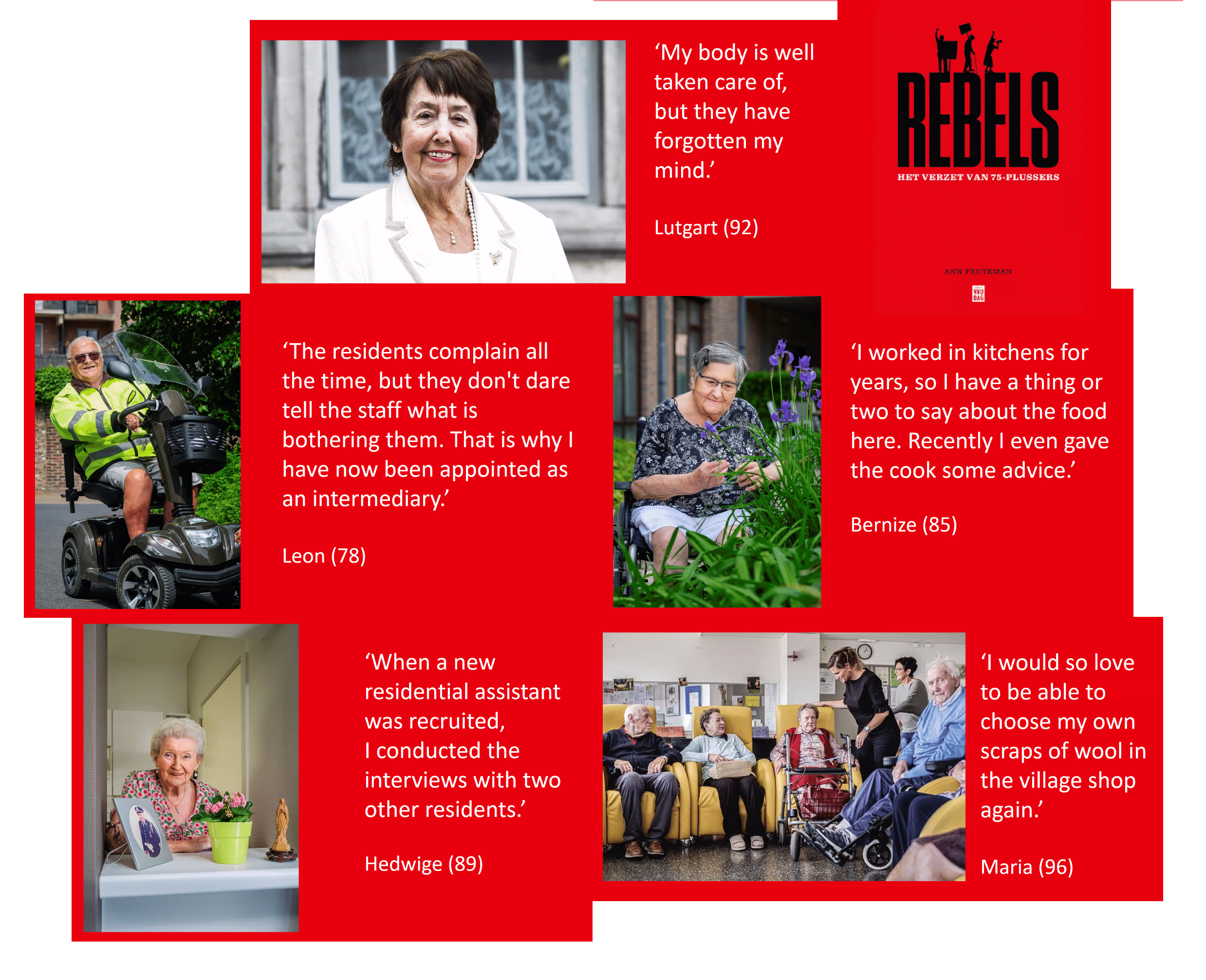
Together with the Czech Presidency of the EU Council, we held our online Annual Conference ‘A Europe that Cares is a Europe that Empowers’ on 18 November 2022. The event articulated around the EU Care Strategy, but also looking beyond the EU towards global policies on ageing and human rights. Policymakers, older persons’ representatives, service providers and international organisations agreed that the moment is now to take a rights-based shift in how policies consider ageing.
The conference was opened by the Czech Deputy Minister for Social Services and Family Policy, Ms Zdislava Odstrčilová, who underlined the positive contribution of EU policies towards ageing in Czechia, with an EU-funded project on developing care, the establishment of a committee on fair pensions and working groups on the rights of older persons. She confirmed that the EU Care Strategy was at the heart of the Presidencies’ efforts on ageing.
Representing the European Commissioner for Jobs and Social Rights, Nicolas Schmit, Ms Ana-Carla Pereira upheld that AGE had significantly contributed to the EU care Strategy, which aims to improve access to care and quality of care for all. This will be an important contribution to gender equality.
A remarkable intervention was made by An Peuteman, Journalist for the Belgian magazine Knack and author of the film ‘Rebels’, who presented portrays of older persons and conveyed their messages. ‘Most older persons are satisfied with the care as such, they say: ‘My body is taken care of, but they forgot my mind’. Ms Peuteman shared stories about how older persons with long-term care needs maintain their autonomy and contribute to their community, by conducting job interviews for care staff, helping a residency’s cook and more. However, you need to engage in real exchange as equals to discover all the dimensions of their personalities.
Quality supporting dignity through standards, good practices, investment and listening
After the introduction, the first panel discussed how to ensure independence and autonomy of persons in need for care by setting the right quality standards. On behalf of Dr Natasha Azzopardi-Muscat, Director of Country Health Policies and Systems at the World Health Organization (WHO) Europe, Dr Yongjie Yon presented the organizations’ approach to the continuum of care: all services need to be integrated, especially in phases of transition, and aim for preventing decline in peoples’ functions. The World Health Organization will provide knowledge bases and technical guidance for long-term care for each country to strengthen these approaches as part of the UN Decade on Healthy Ageing.
The European Commission’s Directorate-General for Employment and Social Affairs was represented by Ms Katerina Ivanković-Knezević. She underlined in particular that the new EU Care Strategy encourages the use and development of new technology in several EU funding programmes that can improve the quality of care, but also builds on improved social dialogue to improve working conditions. There is an ongoing effort to collect statistics on long-term care. The Care Strategy contains a proposal for quality criteria and inclusion of civil society in its implementation, therefore there are many hooks for older persons’ organisations to engage with it.
“The best care is care which is not needed”. Therefore Ms Caroline Costongs of Eurohealthnet participated in the debate emphasising that prevention is possible throughout life, and still relevant and important at older age.
Service providers, represented here by Jiri Horecky, president of European Ageing Network, concurred to the call for reshaping care systems to base them more firmly on the interests of the person in need for care. This requires however investment into good-quality services and a well-trained workforce. Without increased funding, there might be a trade-off between improving accessibility and quality of care.
Sergio Murillo Corzo, Minister for Social Affairs in the Spanish Biscay Province, shared his vision from the perspective of a local authority organising the long-term care system within the wider, regulatory framework. The approach of the province consists in combining different types of care, to support ecosystems at the micro-level and to listen to people, responding to their individual needs and include them by adapting our environments and society.
How can we reach universal access to care? Investment, support to informal carers and development of care in remote areas
The second panel was dedicated to the topic of equity and access to care for all those who need it. Prof Agnieszka Chłoń-Domińczak, member of the High-Level Group on the Future of Social Protection, shared the vision of the high-level group. The COVID19 pandemic has highlighted the need for change to provide care more equitably. The high-level group is likely to recommend more funding to achieve this change and the need for quality standards in long-term care.
Demand for care is expected to increase, confirmed Santiago Calvo Ramos from the European Commission’s DG for Economy and Finance. The efficiency of current systems needs to be improved to be sustainable, and this will probably have to be done by reducing the fragmented governance of long-term care in member States, ensuring the appropriate care setting is used for each case and benchmarking to drive performance improvements. But sustainable and effective funding is needed to provide for the increase of needs that we can foresee.
Stecy Yghemonos of Eurocarers brought the voice of informal carers to the debate. He also acknowledged that there is an increased need for investment to ensure a universal right to care. Informal carers are indispensable from an economic point of view, and they are in majority women. When informal carers are not supported, it creates problems such as social exclusion, health issues, lack of access to education or work. Often, it is not a choice for informal carers to provide unpaid care. The EU Care Strategy has real potential to enable this choice, but it seems to mainly focus on informal carers of working age. Secondly, the issue of providing pension credits to informal carers who cannot participate in the labour market should be addressed.
Dr Nadezhda Todorovska of the Bulgarian Red Cross presented a perspective from national level. There is an issue with the unequal distribution of health professionals in the country, which makes it difficult for people in the more remote areas to access care. Health personnel is migrating to other countries, putting further strain on the system. There are efforts to improve the legal framework and to better integrate health and social services, including home-based services and support to informal carers.
Dr Liz Mestheneos brought another perspective from Greece and the association 50+ Hellas. She called for political will to change the care system. Often, there is not enough State support, so many professional care workers have migrated to the UK and elsewhere. Family care is not recognised, however this is what most people have to rely on. There is an increasing use of technology, but not enough data to assess the benefits of it.
Europe and the human rights of older persons: a call for action
To take a wider perspective, the conference looked at the EU’s policies in the global context of ageing policies in the last segment. It was opened by Irena Moozová, director at the European Commission’s DG Justice and Consumers. She emphasised the importance that the European Union attaches to active and healthy ageing. The main EU principles in this area are mainstreaming equality in all EU’s policies and intersectionality. To strengthen the European Commission’s work in these areas, it will organise an internal training on age discrimination, to which AGE will contribute.
The United Nations is working as well on identifying gaps in the protection of the human rights of older persons in the United Nations (UN) treaties, explained Amal Abou Rafeh, of the UN Division for Economic and Social Affairs. There is however an ‘original sin’, as the Universal Declaration of Human Rights does not explicitly name age as one of the criteria for discrimination tackled by the Declaration. The UN Open-Ended Working Group on Ageing has the mission to propose legal instruments to promote and protect the rights and dignity of older persons. Ms Abou Rafeh called on the EU to stay involved in the process and to take action in favour of this process, taking the lessons learned during the COVID-19 pandemic.
Dr Heidrun Mollenkopf, NGO representative to the UNECE Standing Working Group on Ageing, stated that the current events, from the pandemic to digitalisation and energy crisis, particularly affect older persons. However, older persons’ rights are often neglected or overlooked, and measures are taken without consultation. On international level, the Madrid International Plan of Action on Ageing offers a solid foundation, but it is challenging to move towards action. The plan was revised in June 2022 with new priorities for the next five years, accompanied by a joint declaration by civil society and academics, but now concrete steps are needed to achieve impact on these. She called on the EU to encourage national governments to support the discussion on UN level about a convention on the rights of older persons. It is necessary to have a European focal point on ageing, and a platform where people from different backgrounds can meet physically and talk about their views, rights and needs to support progress towards a convention.
Our debates take place in a context of geopolitical disaster, reminded Alexandre Sidorenko from the European Centre for Social Welfare Policy and Research. He underlined that the Russian invasion of Ukraine led to a severe humanitarian crisis, with 7 million people leaving the country and 16 million in need of humanitarian assistance. There are no reliable figures available about older people in particular, but an estimation of 10 million, a quarter of the entire Ukrainian population, are often overlooked in the humanitarian response to the war. International financial support is needed to support them, and some of it should be earmarked to the specific needs of older persons and to NGOs that help them on the ground.
The panellists concluded that more awareness to fight ageism is needed, so that older persons are no longer seen as a burden to society, but as rights-bearers like anyone else.
Concluding words
The conference was closed by Member of the European Parliament, Milan Brglez, who welcomed the EU Care Strategy, all while voicing his disappointment about minimum standards and indicators that were not yet included into it. The European Commission’s follow-up must ensure that there is effective implementation of the strategy, and especially that coordination of long-term care policies at national level is effective. This is needed to achieve change to empower persons in need for care and support, carers and informal carers, and especially older women.
AGE President Ebbe Johansen agreed that Member States should swiftly agree on indicators and a funding surge for long-term care. He also called for an EU age equality strategy, underlining that the current EU framework is not sufficient to protect older persons from discrimination. Regarding international policies, he called for progress in the United Nations’ reflection process and on the European Union to better work together with the UN in this process. He closed the conference by insisting on the need for financial, logistical and psychological support to older Ukrainians, inside and outside Ukraine.
Useful links:
- AGE Annual Conference – event web page
- Event Live tweeting : #CareEmpowers
- AGE Position on Care: Care must empower us throughout our lives







